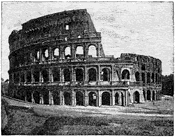

PISH-POSH FROM MY VIRTUAL SPACEby David EideThe Values That Emerge
|

Idle Musings of the Hypothetical Citizen
"You must not fall below the standard of your fathers, who not only won an empire by their own toil and sweat, without receiving it from others, but went on to keep it safe so that they could hand it down to you. And, by the way, it is more of a disgrace to be robbed of what one has than to fail in some new undertaking."
Pericles speaking to the Athenians after the second invasion of the Peloponnesians
On reflection, the hypothetical citizen realized that the citizens who made up the body of politics were the same ones who had occupied, not simply Rome, but Egypt, Japan, and Ethiopia as well. They were those anguished types who were deeply divided between the animal and the human. Even if the system was not repressive, the politics of any given time certainly was. It repressed the ability to build anything beyond the petty squabbles. It repressed any enlargement beyond the stupidity of politicization. It repressed the natural growth of the individual and pinned him between the nihilists and the fearful.
"My only loyalty," he said, gazing out to the stark geometry of the Bridge, "is to what is built well. I am contempory to anything built well."
"But, man, everything is happening now!"
"Everything happening now will vanish into a pinlight. What we are proud of will be despised by the future. What we attempt to transmit to them through our clumsy arms, will be rejected. We are the beginning of something and at the beginning is nothing but outrageous choas and the barbaric spirit."
The first question, perhaps the only question that the hypothetical citizen asked himself was, "is power legitimate?" That was crucial once he understood or been told that his consent is what kept authority floating on the tops of things.
When he entered the question he was met by several problems. Reality seemed to defeat him at every turn. It leered at him and convinced him that neither his consent nor assent was relevant. Sobered by this experience, the hypothetical citizen quickly learned that all that was required of him was his vote and a few acceptable opinions to prove that he had thought about his responsibilities.
Now, as he matured, the citizen had to believe that this loss of savoir-faire in relation to his role as citizen had made it possible for the criminal types, thugs, mediocre, power-hungry types to rise to power and command the resources of the culture.
Democracy, as a word, was easy to say and in the mouth of the wrong person, a dangerously imbued word. It was the act that proved out a democratic man. If a person acted in faith to the founding ideal he could say anything, he could even contradict the very ideal in his word but the act, itself, would preserve the ideal and inspire its intention.
The act of democracy was fearless. And out of it came the political and social relations. When that reversed and the political and social relations were the pods through which the citizen passed, then democracy became an empty phrase. Those relations were like a crystal lake out of which issued tributaries underground to the great rivers and springs.
Do each of the institutions impose their forms on the spirit of the individual? Men and women who have faith in democracy did not fear to be told they were mistaken.
The camera is the culprit. The camera is the thing feared as a carrier of some omnipotent eye, some invisible nobility. He could see that each generation was going to deposit its abstracted consciousness in the camera and pass it down the line as a means of control. The only salvation was in the fact that the body was restless and dynamic.
"The worst division that can occur in a democratic society is a passive citizenry and an aggressive power hungry political class." In fact, when it reached a critical mass, a threshold point, one could rightly assert that the age of the democratic citizen was over and, in fact, the age of democracy was over.
At the very least he had come to the conclusion that civilization was a good thing. Despite the rise of totalitarian ideas on the left and right, the wars, the blunders, the strains that expertness put on society, the crude and vulgar aspects, the influence of the criminal element, it's alienating qualities, its ability to manipulate its own citizens, its inner cannibalism, its jingoism and regressive isms; no doubt it was at the stage that any particular civilization had to go through.
Not that he wanted to go through it at the same time. Far better to connect with the great spirits, the few spirits, who knew a few things than to watch the massive march through the fire as the civilization was called on to grow-up. "Nothing will be left standing when they figure out how controlled they've been...." But then, perhaps a happy sort of resolution will emerge and the whole of it will be transformed into something it can hardly imagine at this moment in time.
The loveliest woman he knew was leaving his life. His thoughts were full of politics and he imagined a whole nation resting, innocently and he saw the whole of the political operation, from the local level to the vast, federal level. He began to fall asleep. He felt himself shoved through a maze of metal playing cards and felt his corporeal, feeling, thinking, guilt-ridden self driven through with such force and terror that he woke up. It faded away and he then dreamed about New York City. He dreamed he came home and his father was angry at him for leaving without his permission. New York had been reduced to a village and there was a little quay where he stood believing that that day would be his last on the planet Earth.
© 2003 David Eide. All rights reserved.
David Eide
Back to Oasis